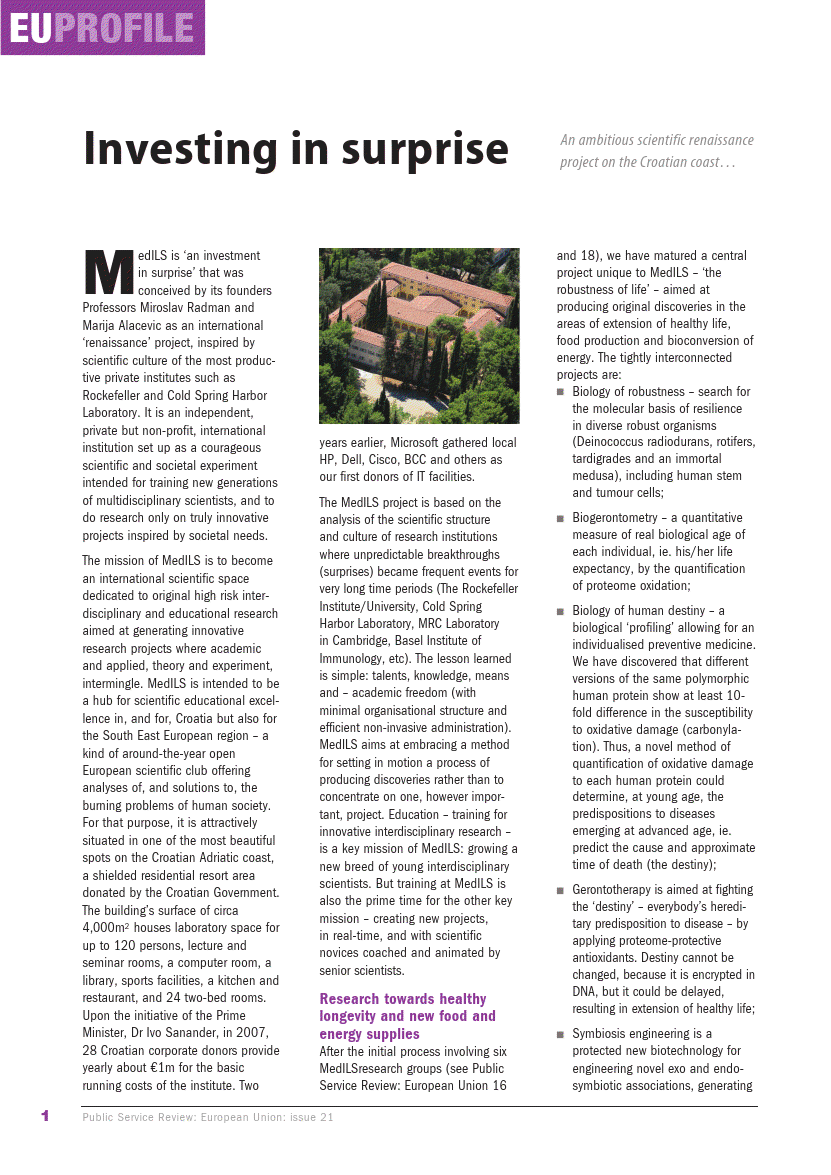

--------------------------
Interdisciplinary Center for Advanced Science and Technology
Based on decision of University in Split on the April 20th 2010 Interdisciplinary Center for Advanced Science and Technology (ICAST) was founded, created on initiative of prof.dr.sc. Vlasta Bonačić- Koutecky. MedILS is incoporated in ICAST center work and projects, and all activities and research are occurring on MedILS institute.
Based on decision of University in Split on the April 20th 2010 Interdisciplinary Center for Advanced Science and Technology (ICAST) was founded, created on initiative of prof.dr.sc. Vlasta Bonačić- Koutecky. MedILS is incoporated in ICAST center work and projects, and all activities and research are occurring on MedILS institute.
Multi-institutional initiative in nanobiology, material science, life science and environment with focus on modelling, computational science and simulations embedded in European and Croatian network of experimental laboratories.
Research directions and interdisciplinary doctoral study:
- Nanoparticle-Biomolecule hybrid systems for development of Biosensors
- Unifying concepts in biological and materials aging
- Nanostructures for design of new materials
- Design of selective peptide antibiotics
- Research in environmental protection and renewable energy resources
Founding members:
Prof. Vlasta Bonačić-Koutecký, PhD, Humboldt University Berlin, Germany and University of Split, Croatia.
Prof. Roko Andričević, PhD, Vice-Rector for Science and International Relations, University of Split, Croatia.
Prof. Miroslav Radman, PhD, University Paris-Descartes Medical School, Paris, France, and Mediterranean Institute for Life Sciences, Split, Croatia.
=========
long story short:
MEDILS RESEARCH:
Research towards healthy longevity and new food and energy supplies
After the initial process involving six MedILS research groups (see PSCA EU 16 and 18), we have matured a central project unique to MedILS - “The robustness of life” - aimed at producing original discoveries in the areas of extension of healthy life, food production and bioconversion of energy. Tightly interconnected projects are: (1) Biology of robustness – search for the molecular basis of resilience in diverse robust organisms (D. radiodurans, rotifers, tardigrades and an immortal medusa), including human stem and tumor cells, (2) Biogerontometry – a quantitative measure of real biological age of each individual, i.e., his/her life expectancy, by the quantification of proteome oxidation, (3) Biology of human destiny – a biological « profiling » allowing for an individualized preventive medicine. We have discovered that different versions of the same polymorphic human protein show at least 10-fold difference in the susceptibility to oxidative damage (carbonylation). Thus, a novel method of quantification of oxidative damage to each human protein could determine, at young age, the predispositions to diseases emerging at advanced age, i.e., predict the cause and approximate time of death (the destiny). (4) Gerontotherapy is aimed at fighting the « destiny » - everybody’s hereditary predisposition to disease – by applying proteome-protective antioxidants isolated in project #1. The destiny cannot be changed, because encrypted in DNA, but it could be at delayed resulting in extension of healthy life.
(5) Symbiosis engineering is a protected new biotechnology for engineering novel exo- and endo-symbiotic associations generating extensive phenotypic changes of the host by natural or engineered bacterial or plastid symbionts without alteration of the host genome. First application is creation of a symbiotic association photosynthesis-fermentation for direct bioconversion of sunlight energy into bioethanol. (6) The International Center for Advanced Science and Technology (ICAST) is the latest addition to MedILS in the areas of theoretical chemistry and metal nanoparticles collaborating on projects 2 and 3.
Through MedILS group leaders Professors D. Krainc (Neurodegeneration), K. Zahradka (Robust bacteria), F. Taddei (Genetics of death in yeast), Dr. A. Krisko, M. Radman (Proteome oxidation) and V. Bonacic Koutecky (ICAST), MedILS is scientifically and institutionally connected with Harvard Medical School - Boston, Institute R. Boskovic – Zagreb, University of Paris-5, Inserm and CNRS – France and Humbolt University - Berlin.
ART SCIENCE LOVE AFAIR _ MEDILS

